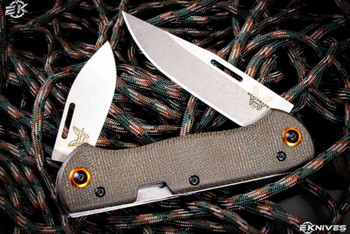8 Items You Should Have in Your Emergency Kit
Posted by Clayton on Mar 19th 2015

There are many things in today’s world that strike fear into peoples’ hearts, but being prepared can go a long way toward alleviating those fears. Part of being prepared is having an emergency kit that has everything you need for if things go south. If you wait for disaster to strike before taking action, it’s too late.
#1. Food and Water
If you don’t have enough to eat and drink, the rest of this list is rather irrelevant. Have a minimum of two- to three-weeks’ worth of nonperishable food that can be easily and quickly prepared. As far as water, have enough so that each member of your household or group is able to consume at least one gallon per day for at least two weeks. Iodine tablets and backpacking water filters are ideal for making sure your group has good, clean drinking water.
#2. Medical Supplies and Sanitation Items
A first-aid kit is crucial to carry with you wherever you go, and, if you are on any medication, having an emergency supply on hand is a good idea when you’re planning on any extended trips. For sanitation purposes, some moist towelettes and garbage bags are a must.
#3. Tools
Having the tools you need at your disposal is always important, whether you’re going about your everyday routine or out in the wilderness. One of the most versatile tools is a survival knife, which is useful in any type of disaster or emergency situation. A high-quality survival knife enables you to easily produce tinder and kindling, split logs, catch fish or small game, repair equipment, and even prepare bandages.
#4. Sources of Light
Few things are more useful in an emergency situation than a flashlight with extra batteries, but flashlights are by no means the only source of light. Headlamps are less common, but are nonetheless more than adequate alternatives to a flashlight. Fire-starting materials like Ferro cerium rods are particularly helpful for wilderness survival, giving you the ability to efficiently build a fire when you need one.
#5. Adequate Clothing and Shelter
If you’re traveling, pack clothing that is appropriate for where you’re going. This may not be that important when you’re just taking a day trip, but when you’re going to be outdoors or are journeying overnight, you should always have clothes that fit your conditions. Pack insulating layers, sleeping bags, emergency blankets, or even tarps and garbage bags, if necessary. You should always have whatever you need to stay warm and sheltered from the elements.
#6. Methods of Communication
Most people take their cell phone with them every time they leave the house, and that’s usually the extent to which we consider communication devices. That’s great if you’re just driving to work or going to the store, but for out-of-town trips and outdoor adventures, a cell phone just won’t cut it. If you get lost or are involved in a crisis, an emergency whistle and signaling mirror can help rescuers find you. A crank-operated weather radio keeps you abreast of developing conditions and other critical information.
#7. Important Documents
This has less to do with being out in the wilderness and more to do with everyday situations. Make copies of all of your vital documents, including your birth certificate, the deed to your house, insurance policy information, and a list of all of your medical details. Once you’ve made copies, store them in a safe place.
#8. Cash
As convenient as it is to pay with credit cards and debit cards, it’s always a good idea to carry some amount of cold, hard cash on your person. While cash won’t do you any good in the woods, it’s always best to have some on hand just in case you lose access to your bank account, credit or debit cards, or have to pay for something in cash.
Final Thoughts
When bad circumstances come about, you should ideally have enough supplies to survive for at least 72 hours. In situations like earthquakes, hurricanes, tornadoes, and other disasters, you need to be able to hold on long enough for rescuers to search the entire area affected. A sufficient emergency preparation kit has everything you need to survive dire situations, whether they take place in the wilderness or in your own backyard.

